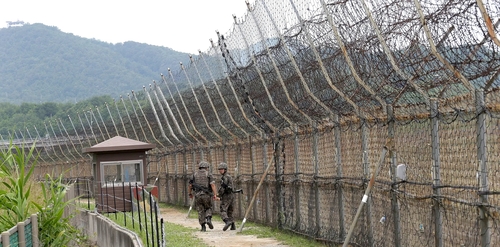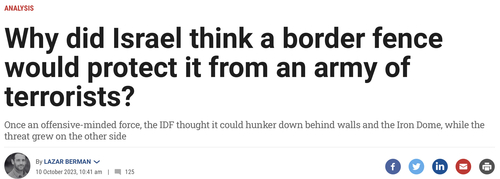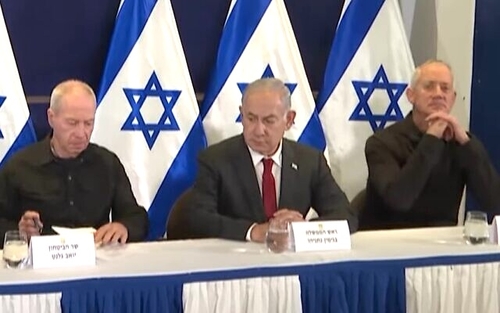Global Review: Was the Hamas attack foreseeable?
Daniel Pipes: Given its history and ideology, that Hamas would again attack Israel was foreseeable. But the size and nature of the attack came as a complete surprise. It resembled 9/11 in the sense that both times, jihadis executed a previously unimaginable idea. By the way, it has caused the South Korean government to reconsider its border arrangement with North Korea.
 South Korea's defenses in 2019 at the Demilitarized Zone in Gangwon Province. |
GR: Was the attack related to preventing Israeli normalization with Saudi Arabia, to the Itamar Ben Gvir and Bezalel Smotrich duo, to heightened violence on the West Bank, to demands from Tehran, to the date (50 years and 1 day), or something else?
DP: Perhaps any and all of these; we do not know the reason for the timing. It could simply have been that preparations were in place.
GR: Was Israel caught by surprise due to an intelligence failure or to a ruling coalition being so obsessed with other matters – notably judicial reform and a deal with Saudi Arabia – that it ignored warnings from the intelligence services?
DP: All reports concur that a massive intelligence failure occurred.
GR: Did the Israeli security establishment focus too much on Iran and Hezbollah, seeing these as the main threats, and forgot about Hamas?
DP: No, I believe the real problem was misunderstanding the nature of Hamas. The security establishment believed it could be managed through economics. The delusion that enrichment can tame Palestinians goes back to the very origins of Zionism and persists despite never succeeding.
GR: Did Israelis, with their high-tech defense systems, F-35s, and nuclear weapons, have a false sense of security that made them unprepared for asymmetric war?
DP: Yes, and the Israel Defense Forces (IDF) has turned into a truly defensive force vis-à-vis the Palestinians, as Lazar Berman has eloquently explained.

GR: What does Israel Victory mean in the present context?
DP: That's easy. It means extirpating Hamas, removing it entirely from Gaza.
GR: Israel's Prime Minister Benjamin Netanyahu warned Gazans to get out of Gaza. But where should they go?
DP: That's tough. After that warning, an IDF spokesperson showed maps and instructed residents where to evacuate. I cannot tell if the proposed refuges really provide shelter or not. I suspect not. Israeli forces need to make minimizing civilian casualties a priority.
GR: Do you think a ground offensive in Gaza by the IDF will be protracted, especially given Hamas' years of preparation, including a sophisticated tunnel system?
DP: It depends how meticulous the IDF is. If it goes house to house, as in Jenin in 2002, the operation will be slower and costlier in lives than if it blasts its way through. That in turn depends in good part on the level of anger in Israel.
GR: What sort of leverage do the Israeli hostages give Hamas?
DP: My inclination is to predict "not much." Precious as each life is, the body politic is not in a mood to be deterred by further deaths, either of hostages or of soldiers.
GR: Will Hezbollah join in?
DP: That is a big uncertainty. I suspect feverish debates are taking place among Hezbollah leaders and with Tehran to decide this question. If I had to bet, I'd say no, because the rage in Israel will deter Hezbollah.
GR: What is your prediction on how the massacre will affect Israeli politics: the emergency government, putting aside judicial reform, the end of Netanyahu's political career?
DP: The emergency government formed on Oct. 11 and almost nobody noticed. But it represents a major political development with many implications beyond Gaza; in particular, the ruling coalition no longer depends on its hard-liners. Judicial reform looks defunct. Netanyahu used up his ninth life on Oct. 7; in power for nearly all of the past fifteen years, he cannot escape blame for the catastrophe. I believe his political career will wind down.
 Announcing Israel's emergency government on Oct. 11: Defense Minister Yoav Gallant (L), Prime Minister Benjamin Netanyahu, National Unity head Benny Gantz. |
GR: How does this affect the Abraham Accords, a possible Saudi-Israel deal, and the India-Middle East Europe Economic Corridor (IMEC)?
DP: Israel's ferocious reaction shakes the Abraham Accords but I expect they will not break. A Saudi deal will be delayed but not halted. IMEC represents no more than a wish at this time.
GR: What are the non-Western responses (Russia, China, Muslim-majority countries, etc.) to the massacre?
DP: A survey by the Washington Institute for Near East Policy on Oct. 11 finds that "Around the globe, representatives of approximately a hundred countries have reacted to the war in varying ways. At least forty-four nations have publicly expressed their unequivocal condemnation of Hamas and explicitly decried its tactics as terrorism." This amounts to unusually strong support for Israel.
GR: Might the Hamas war affect the U.S. pivot to Asia?
DP: It temporarily returns attention to the Middle East but I expect long-term trends away from the region will continue.
GR: What concrete steps should Western governments take in response to the Hamas attack?
DP: Where do I begin? For starters: Urge Israel to destroy Hamas. Stop all aid to the Palestinian Authority. Sanction Türkiye and Qatar for their help to Hamas.
GR: What steps should Germany, specifically, take?
DP: The same steps as other democracies but more so, given Germany's unique and unchanging debt to the Jewish people.